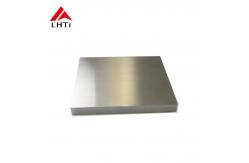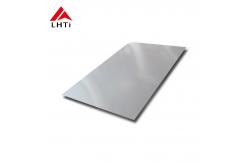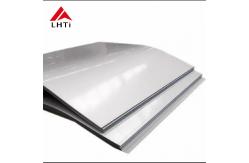ASTM B265 Gr7 Titanium Sheet for Chemical Industry with Outstanding Mechanical Properties
|
|
ASTM B265 Gr7 Titanium Plate with Polished Surface for the Chemical IndustryIntroductionIn the demanding realm of the chemical industry, materials are subjected to extreme conditions that can lead to rapid degradation if not chosen carefully. One material that has emerged as a front-runner in this sector is the ASTM B265 Gr7 titanium plate, particularly when it features a polished surface. This alloy combines exceptional mechanical properties with outstanding corrosion resistance, making it an ideal choice for a variety of applications. As industries strive for efficiency, safety, and longevity, the adoption of Gr7 titanium plates is becoming increasingly critical. Understanding ASTM B265 Gr7 TitaniumASTM B265 is a specification that outlines the requirements for titanium and titanium alloy plates and sheets, with Grade 7 being a standout option due to its unique composition. This alloy is primarily titanium but is alloyed with a small percentage of palladium, which significantly enhances its resistance to corrosive environments. The incorporation of palladium allows Gr7 titanium to maintain its integrity even when exposed to harsh chemicals, making it a preferred choice for applications in chemical processing and storage. The mechanical properties of Gr7 titanium are equally impressive, contributing to its versatility in various industrial applications. With a tensile strength that typically ranges from 80,000 to 120,000 psi, this alloy can withstand significant stress without yielding. Additionally, the yield strength of approximately 60,000 to 100,000 psi ensures that components made from this material can endure the rigors of operational demands, providing reliability and stability in critical applications. Moreover, Gr7 titanium's low density of about 0.16 lb/in³ allows for a favorable strength-to-weight ratio, making it suitable for applications where minimizing weight is essential. This feature is particularly beneficial in large structures like chemical storage tanks, where excess weight can lead to increased operational costs and challenges. Overall, the combination of these mechanical properties and lightweight characteristics makes ASTM B265 Gr7 titanium an ideal material for the chemical industry. The Significance of a Polished SurfaceThe surface finish of a material plays a crucial role in its performance, especially in the chemical industry, where corrosion resistance is paramount. The polished surface of ASTM B265 Gr7 titanium plates serves to minimize surface roughness, which can significantly reduce the risk of corrosion. A smooth finish not only prevents the accumulation of contaminants but also protects the material from localized corrosion, ensuring that the integrity of components is maintained over time. In addition to enhancing corrosion resistance, the polished surface provides aesthetic advantages, making Gr7 titanium plates suitable for applications where appearance matters. For instance, in industries that value cleanliness and presentation, such as pharmaceuticals or food processing, the polished finish can contribute to a more hygienic environment. Furthermore, the smooth surface can improve fluid dynamics in systems involving pumps and reactors by reducing friction, which can lead to energy savings and improved efficiency. Another critical aspect of a polished surface is its contribution to hygiene. In chemical processing, where materials often come into contact with sensitive substances, a smooth finish can help prevent the buildup of bacteria and other contaminants. This is particularly important in applications that require strict adherence to health and safety regulations, ensuring that equipment remains compliant and safe for use. Advantages of Using ASTM B265 Gr7 Titanium Plates1. Superior Corrosion ResistanceThe most notable advantage of ASTM B265 Gr7 titanium plates is their exceptional corrosion resistance. This property is vital for materials used in the chemical industry, where exposure to corrosive substances is commonplace. Gr7 titanium can withstand a wide range of aggressive chemicals, including strong acids like hydrochloric and sulfuric acid, which often lead to rapid deterioration of other metals. This resistance not only protects the equipment but also contributes to the overall safety of the operation by minimizing the risk of leaks and failures. 2. High Strength-to-Weight RatioGr7 titanium's low density coupled with high strength offers a significant benefit in various applications, particularly those requiring robust materials without added weight. This characteristic is especially important in constructing chemical storage tanks, piping systems, and other equipment where excess weight can complicate handling and installation. By utilizing Gr7 titanium, industries can achieve substantial weight savings, which can translate to lower shipping costs and enhanced operational efficiencies. 3. Longevity and DurabilityThe durability of ASTM B265 Gr7 titanium plates is another compelling reason for their use in the chemical industry. Components made from this alloy can endure prolonged exposure to harsh environments without succumbing to wear or degradation. This longevity translates to extended service life, reducing the need for frequent replacements and maintenance. Industries benefit from lower operational costs and minimized downtime, allowing for smoother and more efficient processes. 4. BiocompatibilityWhile biocompatibility is often discussed in the context of medical applications, it is also relevant in the chemical industry, particularly for processes involving biological substances. The inert nature of Gr7 titanium ensures that it does not react adversely with the materials it contacts, making it a safe choice for various applications. This quality is essential in industries where maintaining the integrity of the product is critical, such as in pharmaceuticals and food processing. 5. Versatility in FabricationGr7 titanium plates are highly versatile, allowing for fabrication into a variety of shapes and sizes to meet specific industrial needs. The alloy can be cut, welded, and machined without compromising its structural integrity, making it suitable for custom applications that require precise engineering. This adaptability is essential in the chemical industry, where specialized equipment is often necessary to optimize operational performance and meet regulatory standards. Applications of ASTM B265 Gr7 Titanium Plates1. Chemical Storage TanksOne of the primary applications for ASTM B265 Gr7 titanium plates is in the construction of chemical storage tanks. These tanks must be constructed from materials that can withstand corrosive contents without degradation over time. Gr7 titanium’s properties ensure that these tanks maintain their structural integrity, minimizing the risk of leaks that could lead to environmental contamination or safety hazards. 2. Heat ExchangersHeat exchangers play a crucial role in chemical processing, facilitating heat transfer between fluids in a safe and efficient manner. The high thermal conductivity and corrosion resistance of Gr7 titanium plates make them particularly well-suited for constructing heat exchangers. By using this alloy, industries can improve operational efficiency while ensuring that the equipment remains durable under varying temperatures and aggressive chemical conditions. 3. Piping SystemsPiping systems are essential for transporting corrosive fluids in chemical processing. The strength and lightweight nature of Gr7 titanium make it an ideal choice for pipes that must endure high pressure and aggressive chemicals. Additionally, the polished surface of Gr7 titanium reduces friction during fluid transport, enhancing the overall efficiency of the system. 4. ReactorsChemical reactors require materials that can withstand high pressure and temperature while resisting corrosive substances. Gr7 titanium plates are often used in the construction of reactors due to their strength and durability. This capability ensures that chemical processes can be conducted safely and effectively, contributing to the overall success of operations. 5. Valves and FittingsIn chemical processing, valves and fittings must operate reliably under high-stress conditions. Gr7 titanium plates can be manufactured into high-performance valves that provide dependable operation even in extreme environments. The reliability of these components is crucial for maintaining system integrity and safety, preventing failures that could disrupt operations. 6. Pump ComponentsPumps are vital in the chemical industry, requiring materials that can handle aggressive substances without deteriorating. The polished surface of Gr7 titanium reduces wear on pump components, extending their lifespan and improving operational efficiency. By utilizing this alloy in pump construction, industries can lower maintenance costs and increase productivity. 7. Specialized EquipmentCustom equipment designed for specific chemical processes can be fabricated from ASTM B265 Gr7 titanium plates. The versatility of the material allows for the creation of specialized components that meet unique processing needs. This adaptability is essential for industries requiring tailored solutions to optimize their operations and ensure compliance with industry standards. Challenges and ConsiderationsWhile the benefits of ASTM B265 Gr7 titanium plates are significant, there are challenges that must be addressed when considering their use. One of the primary challenges is the cost. Titanium is generally more expensive than alternative materials such as stainless steel or carbon steel. However, companies must weigh the initial investment against the long-term benefits of reduced maintenance, increased durability, and lower operational costs. Another challenge lies in the fabrication of titanium, which requires specialized equipment and expertise. Ensuring that fabricators are experienced in working with titanium is crucial to achieving the desired quality and performance. This necessity can lead to longer lead times and potential complications if not managed properly. Companies must ensure they collaborate with reliable suppliers who understand the specific requirements for working with titanium. Material compatibility is also a critical consideration when using titanium in chemical applications. Galvanic corrosion can occur when dissimilar metals come into contact in a corrosive environment. Careful selection and design are vital to avoid such issues, ensuring the longevity and integrity of the entire system. Addressing these challenges requires careful planning and collaboration among stakeholders to ensure optimal outcomes. ConclusionThe ASTM B265 Gr7 titanium plate with a polished surface represents a premier material choice for the chemical industry, providing a combination of strength, corrosion resistance, and versatility that is unmatched by many other materials. As industries continue to evolve and face new challenges, the adoption of advanced materials like Gr7 titanium becomes essential. By leveraging these materials, companies can enhance operational performance while contributing to long-term cost savings and environmental responsibility. In a rapidly changing market, the strategic use of ASTM B265 Gr7 titanium plates positions businesses for future success in the chemical industry. With their ability to withstand harsh environments and deliver reliable performance, these plates are not just an investment in material but a commitment to safety, efficiency, and sustainability. As the chemical industry continues to innovate, materials like Gr7 titanium will undoubtedly play a pivotal role in shaping the future of processing and manufacturing.
|
||||||||||||||||||||||||||||||||||||||||||||||||
| Product Tags: Chemical Industry Titanium Sheet Outstanding Mechanical Properties Titanium Sheet ASTM B265 Gr7 Titanium Sheet | ||||||||||||||||||||||||||||||||||||||||||||||||

|
Titanium Sheet Gr5 Titanium Alloy Sheet for The Future of High-Performance Aviation and Petroleum Industries |
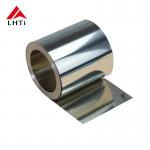
|
Titanium Alloy Sheet Maximize Performance With ASTM B265 Titanium Sheets: Strong, Lightweight, And Biocompatible |
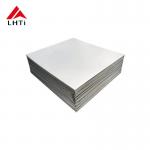
|
Grade 7 ASTM B265 Titanium Alloy Sheet Titanium Sheet For Chemical Industry |
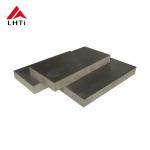
|
Chemical Industry Processing Service Titanium Plate with Gr7 Alloy Sheet ASTM B265 Polished Surface |

|
Grade 5 Titanium Alloy Sheet Ti Plate Titanium Plate Properties And Applications |

|
Titanium Sheet And Plate Materials: Grade 2 And Grade 5 Titanium Alloys |

